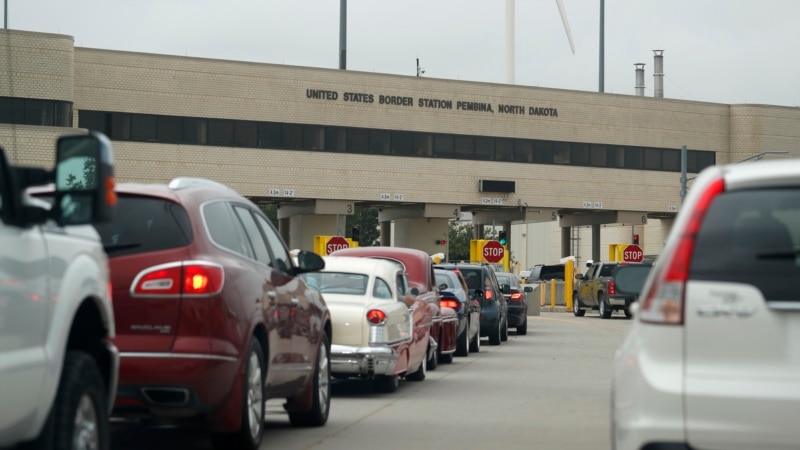
President Donald Trump said on Monday that tariffs on Canadian and Mexican imports are “on time and on schedule” despite efforts by the countries to beef up border security and halt the flow of fentanyl into the U.S. ahead of a March 4 deadline.
“The tariffs are going forward on time, on schedule,” Trump told a joint news conference with French President Emmanuel Macron. He had been asked whether Canada and Mexico had done enough to avoid the punishing 25% U.S. duties.
Many had hoped the top two U.S. trading partners could persuade Trump’s administration to further delay tariffs that would apply to over $918 billion worth of U.S. imports from the two countries, from autos to energy. This could wreak havoc on the integrated North American economy, with the automotive sector hit particularly hard.
Trump did not specifically mention the March 4 deadline. He later referred to his desire for “reciprocal” tariffs to match the duty rates and offset the trade barriers of all countries, including France.
Trump and Macron did not publicly discuss another sticking point — digital services taxes imposed by France, Canada and other countries aimed at dominant U.S. tech giants including Google, Facebook and Amazon.
On Friday, Trump ordered his administration to revive tariff investigations into countries that levy digital service taxes on U.S. firms.
Border hopes dimmed
Canada and Mexico have taken steps to beef up border security, which bought them about a month’s reprieve from Trump’s earlier Feb. 1 deadline to impose the tariffs, based on a national emergency declaration.
Any further delay negotiated ahead of the deadline will keep the tariff threat in place at least until clear evidence emerges that Canadian and Mexican measures are working, said Dan Ujczo, a lawyer specializing in U.S.-Canada trade matters.
“There’s progress being made on the security front,” said Ujczo, senior counsel with Thompson Hine in Columbus, Ohio. “But it’s overly optimistic to think that those tariffs would be fully rescinded.”
The White House, U.S. Trade Representative’s office and Commerce Department did not respond to requests for comment on negotiations expected this week ahead of the March 4 deadline.
More tariff threats
Since Trump’s initial 25% tariff threat and imposition of a 10% duty on all Chinese imports, he has heaped on more tariff actions that could muddy the waters on border negotiations.
These include substantially raising tariffs on steel and aluminum to a flat 25%, rescinding longstanding exemptions for Canada and Mexico, the largest sources of U.S. imports of the metals. These steep increases, which also extend to hundreds of downstream steel products, are due to take effect a week after the border tariffs, on March 12.
Trump has also said he wants to impose 25% tariffs on imports of autos, pharmaceuticals and semiconductors, and to match duty rates and trade barriers of other countries.
The threatened tariffs could kick off an early launch of a renegotiation of the U.S.-Mexico-Canada agreement on trade that is due by 2026, Ujczo added.
Trump signed the USMCA into law in 2020 after renegotiating the 1994 North American Free Trade Agreement but has increasingly expressed dissatisfaction with imports of autos from Mexico and Canada.
Progress cited
On Thursday, Mexican Economy Minister Marcelo Ebrard said on Thursday he had a “constructive dialog” during a meeting with Trump’s top trade officials.
Ebrard said in a post on X that the “joint work” on U.S. trade matters starts on Monday.
Mexico has begun deploying as many as 10,000 national guard troops to its northern border, as part of the agreement that Mexican President Claudia Sheinbaum said also called on the U.S. to work to stop the flow of firearms into Mexico.
Canada this month created a new fentanyl czar to coordinate the fight against smuggling of the deadly opioid, appointing senior intelligence official Kevin Brosseau to the post.
Ottawa also has reclassified drug cartels as terrorist entities and has deployed drones, helicopters and other surveillance technologies on the vast northern U.S. border.
Canadian Prime Minister Justin Trudeau has kept in close contact with Trump on the border issues in recent days, including in a Saturday call that included discussions of joint efforts to curb fentanyl trade. He has threatened retaliatory tariffs on $107 billion of U.S. imports, including American beer, wine and bourbon and Florida orange juice, but said last week that Canada is “going to do the work” to ensure that tariffs are not imposed.
